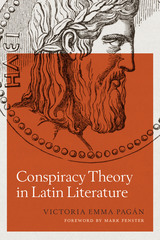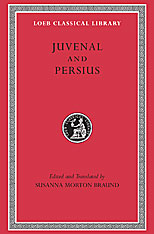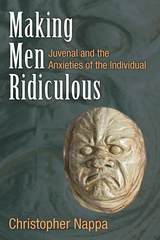
Conspiracy theory as a theoretical framework has emerged only in the last twenty years; commentators are finding it a productive way to explain the actions and thoughts of individuals and societies. In this compelling exploration of Latin literature, Pagán uses conspiracy theory to illuminate the ways that elite Romans invoked conspiracy as they navigated the hierarchies, divisions, and inequalities in their society. By seeming to uncover conspiracy everywhere, Romans could find the need to crush slave revolts, punish rivals with death or exile, dismiss women, denigrate foreigners, or view their emperors with deep suspicion. Expanding on her earlier Conspiracy Narratives in Roman History, Pagán here interprets the works of poets, satirists, historians, and orators—Juvenal, Tacitus, Suetonius, Terence, and Cicero, among others—to reveal how each writer gave voice to fictional or real actors who were engaged in intrigue and motivated by a calculating worldview.
Delving into multiple genres, Pagán offers a powerful critique of how conspiracy and conspiracy theory can take hold and thrive when rumor, fear, and secrecy become routine methods of interpreting (and often distorting) past and current events. In Roman society, where knowledge about others was often lacking and stereotypes dominated, conspiracy theory explained how the world worked. The persistence of conspiracy theory, from antiquity to the present day, attests to its potency as a mechanism for confronting the frailties of the human condition.

Mordant verse satire.
The bite and wit of two of antiquity’s best satirists are captured in this Loeb Classical Library edition.
Persius (AD 34–62) and Juvenal (writing about sixty years later) were heirs to the style of Latin verse satire developed by Lucilius and Horace, a tradition mined in Susanna Braund’s introduction and notes. Her notes also give guidance to the literary and historical allusions that pepper Persius’ and Juvenal’s satirical poems—which were clearly aimed at a sophisticated urban audience. Both poets adopt the mask of an angry man, and sharp criticism of the society in which they live is combined with flashes of sardonic humor in their satires. Whether targeting common and uncommon vices, the foolishness of prayers, the abuse of power by emperors and the Roman elite, the folly and depravity of Roman wives, or decadence, materialism, and corruption, their tone is generally one of righteous indignation.
Juvenal and Persius are seminal as well as stellar figures in the history of satirical writing. Juvenal especially had a lasting influence on English writers of the Renaissance and succeeding centuries.

THIS EDITION HAS BEEN REPLACED BY A NEWER EDITION
Juvenal, Decimus Iunius Iuvenalis (ca. AD 60140), master of satirical hexameter poetry, was born at Aquinum. He used his powers in the composition first of scathing satires on Roman life, with special reference to ineptitude in poetry (Satire 1); vices of fake philosophers (2); grievances of the worthy poor (3); and of clients (5); a council-meeting under Emperor Domitian (4); vicious women (6); prospects of letters and learning under a new emperor (7); virtue not birth as giving nobility (8); and the vice of homosexuals (9). Then subjects and tone change: we have the true object of prayer (10); spendthrift and frugal eating (11); a friend's escape from shipwreck; will-hunters (12); guilty conscience and desire for revenge (13); parents as examples (14); cannibalism in Egypt (15); privileges of soldiers (16, unfinished).
Persius Flaccus, Aulus (AD 3462), of Volaterrae was of equestrian rank; he went to Rome and was trained in grammar, rhetoric, and Stoic philosophy. In company with his mother, sister and aunt, and enjoying the friendship of Lucan and other famous people, he lived a sober life. He left six Satires in hexameters: after a prologue (in scazon metre) we have a Satire on the corruption of literature and morals (1); foolish methods of prayer (2); deliberately wrong living and lack of philosophy (3); the well-born insincere politician, and some of our own weaknesses (4); praise of Cornutus the Stoic; servility of men (5); and a chatty poem addressed to the poet Bassus (6).

In his sixteen verse satires, Juvenal presents speakers who decry the breakdown in traditional Roman values and the status of Roman men as they are confronted by upstart foreigners, devious and deviant women, class traitors, the power of the imperial household, and even the body itself. The satirist castigates vice and immorality even as he revels in describing them. This book locates Juvenal’s targets among the matrices of birth, wealth, class, gender, and ethnicity and walks carefully through a number of his most arresting vignettes in order to show not only what, but how, he satirizes. Moreover, the analysis shows that Juvenal’s portraits sometimes escape his grasp, and, as often as not, he ends up undermining the voice with which he speaks and the values he claims to hold dear. Individual chapters look at the satirist himself, rebellious bodies, disgraced aristocrats, uppity (even murderous) wives, and the necessary but corrupting power of money. The conclusion considers the endurance of both the targets and the rhetoric behind them in the modern world.
Making Men Ridiculous will interest scholars and advanced students of ancient satire, later European satire, imperial Roman culture and literature, and class, gender, and sexuality in the ancient world.

READERS
Browse our collection.
PUBLISHERS
See BiblioVault's publisher services.
STUDENT SERVICES
Files for college accessibility offices.
UChicago Accessibility Resources
home | accessibility | search | about | contact us
BiblioVault ® 2001 - 2024
The University of Chicago Press









